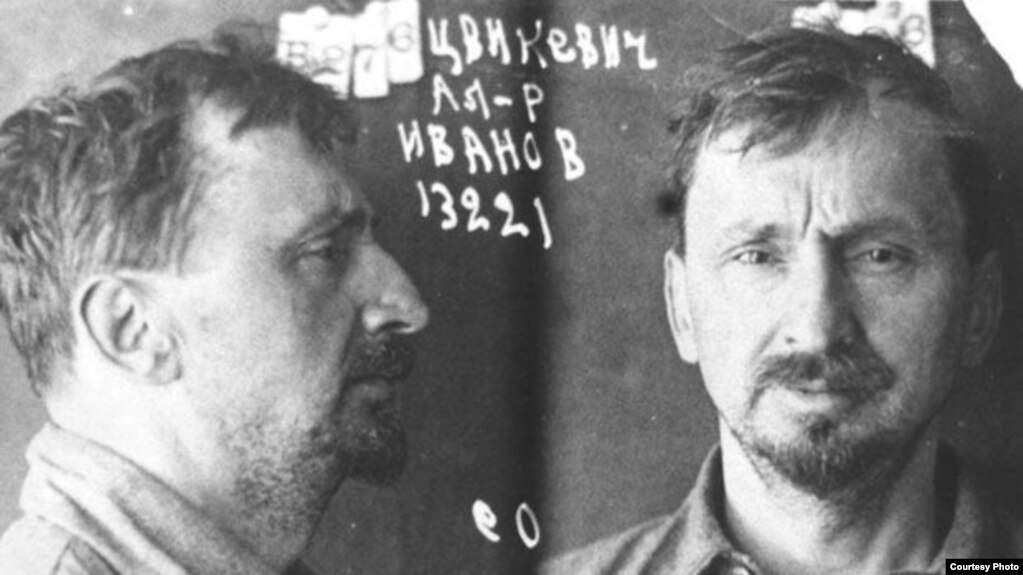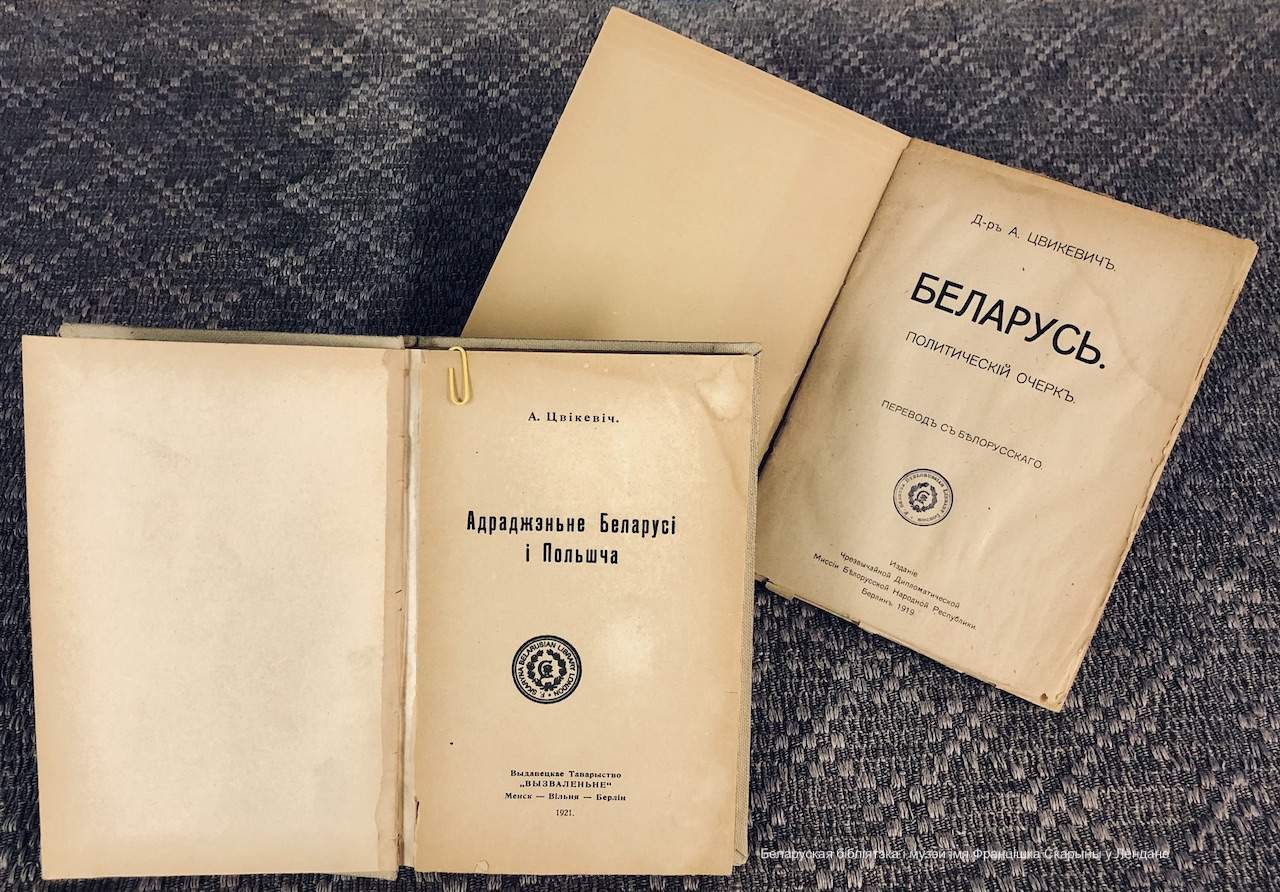Аляксандар Цьвікевіч (1888-1937) – вядомы палітык, юрыст, філёзаф і публіцыст, які стаяў ля вытокаў дыпляматыі Беларускае Народнае Рэспублікі і быў прэм’ер-міністрам эміграцыйнага ўраду БНР. Як і многія іншыя дзеячы беларускага незалежніцкага руху, Цьвікевіч стаў ахвярай сталінскіх рэпрэсіяў. Ягоную жыцьцёвую гісторыю мы распавядаем на нашай выставе “Няскораныя”.
Цьвікевіч нарадзіўся ў Берасьці ў сям’і фэльчара. Атрымаўшы бліскучую адукацыю на юрыдычным факультэце Пецярбургскага ўнівэрсытэта, ён вярнуўся на радзіму і працаваў прысяжным павераным у Пружанах і Берасьці. З пачаткам Першае сусьветнае вайны быў вымушаны выехаць у Расею. У 1917 г. у Маскве разам зь іншымі бежанцамі-беларусамі заснаваў Беларускую народную грамаду, у аснове палітычнай плятформы якой ляжала патрабаваньне аўтаноміі Беларусі ў складзе Расейскай імпэрыі. У канцы таго ж году А. Цьвікевіч быў абраны ў склад рады Першага Ўсебеларускага зьезьду ў Менску, пасьля разам з С. Рак-Міхайлоўскім прадстаўляў выканкам зьезду на мірных перамовах ў Берасьці. Расейскія ўлады былі супраць удзелу беларусаў у якасьці самастойнай дэлегацыі, таму нашыя суродзічы ўвайшлі ў дэлегацыю Украінскай Народнай Рэспублікі ў якасьці дарадцаў.
У 1918 г. Цьвікевіч працаваў у складзе беларускай дыпляматычнай місіі БНР у Кіеве, дзе актыўна дамагаўся прызнаньня незалежнасьці Беларусі іншымі краінамі, займаўся пытаньнямі дзяржаўнай мяжы і фінансавай падтрымкі ўраду БНР. У Кіеве ён арганізаваў Беларускую гандлёвую палату, выдаваў газэту “Белорусское эхо”. Пазьней прадстаўляў Раду БНР у складзе дыпляматычных місіяў у Бэрліне і Вене. У 1921 г. ён становіцца міністрам замежных справаў БНР, а пасьля адстаўкі В. Ластоўскага ў 1923 г. узначальвае новасфармаваны ўрад на пасадзе прэм’ер-міністра. Ягоны досьвед дыпляматычнай і палітычнай дзейнасьці выліўся ў шматлікія публікацыі, прысьвечаныя праблемам незалежнасьці Беларусі і дзяржаўнасьці беларускага народу.
Перакананы змагар за нацыянальнае самавызначэньне, Цьвікевіч паверыў палітыцы беларусізацыі, якая праводзілася ў савецкай Беларусі ў сярэдзіне 20-х гг. У 1925 г. Цьвікевіч склікае ў Бэрліне ІІ Усебеларускую канфэрэнцыю, дзе прапаноўвае спыніць дзейнасьць эміграцыйнага ўраду БНР і прызнаць Менск адзіным цэнтрам нацыянальнага і дзяржаўнага адраджэньня Беларусі. І хаця Рада БНР адхіліла гэтую прапанову, пазыцыя Цьвікевіча атрымала падтрымку сярод большасьці эміграцыйных дзеячоў. Многія зь іх, як і сам былы прэм’ер, пераехалі ў савецкую Беларусь, каб далучыцца да беларускага нацыябудаўніцтва, і ўжо праз некалькі гадоў сталі ахвярамі сталінскага тэрору.
Alaksandar Ćvikievič (1888-1937), a well-known politician, lawyer, philosopher and publicist, stood at the origins of the diplomacy of the newly established Belarusian Democratic Republic and was a prime minister of its government-in-exile. Like many other figures of the Belarusian independence movement of the early 20th century, Ćvikievič became a victim of Stalin’s purges. His illustrious and tragic life story is retold at our exhibition The Unbroken.
Ćvikievič was born in Brest-Litovsk (now Brest in Western Belarus) into the family of a paramedic. Having received an excellent education at the Faculty of Law of St Petersburg University, he returned to his homeland and worked as a sworn attorney in Pružany and Brest-Litovsk. After the outbreak of the First World War, he was evacuated to Russia. There, in 1917, with other Belarusian refugees, he founded a society which demanded the autonomy of Belarus within the Russian Empire. At the end of that year, Ćvikievič was elected to the council of the First All-Belarusian Congress in Minsk. Later, together with another Belarusian politician, Symon Rak-Michailoŭski, he represented the executive committee of the Congress at the peace talks with Germany in Brest-Litovsk. Representatives of Soviet Russia headed by Leon Trotsky vetoed a separate representation of Belarus at the peace talks; our compatriots had to join the delegation of the Ukrainian Democratic Republic as their advisers.
In 1918, Ćvikievič worked as a member of a Belarusian diplomatic mission in Kyiv where he actively sought the recognition of the independence of Belarus by other countries, dealt with the state border issues and funding to the government of the Belarusian Democratic Republic. He also organised a Belarusian chamber of commerce in that city and published the newspaper Belarusian Echo. Later, he was part of the Council of the Belarusian Democratic Republic’s diplomatic missions in Berlin and Vienna. In 1921, he became the Minister of Foreign Affairs of the Republic, and, after the resignation of Vacłaŭ Lastoŭski in 1923, he headed the newly formed government-in-exile as prime minister. He shared his experience in diplomacy and politics in numerous publications on the matters of Belarusian statehood.
A passionate advocate of national self-determination, Ćvikievič supported the policy of Belarusianisation carried out in Soviet Belarus in the mid-1920s. In 1925, he convened the Second All-Belarusian Conference in Berlin where he proposed to cease the activities of the government-in-exile of the Belarusian Democratic Republic and to recognise Soviet Minsk as the only centre of the national and state revival. Although the Council of the Belarusian Democratic Republic rejected the proposal Ćvikievič’s proposition received support from many Belarusian activists in exile. Some of them, like the former prime minister himself, moved to Soviet Belarus to join Belarusian nation-building; soon after they fell victim to Stalin’s unfolding terror regime.

У савецкай Беларусі Цьвікевіч працаваў у Наркамфіне, пазьней – вучоным сакратаром Інбелкульту. Тут выйшла ягоная фундамэнтальная праца “Западно-руссизм. Нарысы з гісторыі грамадзкай мысьлі на Беларусі ў XIX і пачатку XX в.” – грунтоўнае дасьледаваньне ідэалёгіі і практыкі русіфікацыі ў Беларусі ў часы Расейскай імпэрыі, якая ня страціла свайго значэньня і сёньня. Праца друкавалася па частках у часопісе “Полымя”, але адразу пасьля выхаду адной кнігай у 1929 г. была забароненая, і амаль увесь трохтысячны наклад – зьнішчаны.
У 1930 г. савецкія ўлады арыштоўваюць Цьвікевіча па прыдуманай справе “Саюзу вызваленьня Беларусі” і прысуджаюць яму пяць гадоў высылкі. Адбываў прысуд Цьвікевіч разам зь сям’ёй у далёкіх рэгіёнах Расеі. Цьвікевіч быў паўторна арыштаваны 17 сьнежня 1937 г., а 30 сьнежня 1937 г. – расстраляны ў Менску.
In Soviet Belarus, Ćvikievič worked in the People’s Commissariat (Ministry) of Finance and later – as an academic secretary of the Institute of Belarusian Culture (Inbelcult), the predecessor of the Academy of Sciences. His fundamental work, Westrussianism: Essays on the History of Public Thought in Belarus in the XIX and early XX centuries – a thorough study of the ideology and practice of Russification in Belarus during the Russian Empire – was published at that time; it has not lost its significance even today. The work was printed in parts in the Polymia (The Flame) literary journal. Immediately after it was published as a book in 1929, it was banned and almost the entire 3,000 print run was destroyed.
In 1930, the Soviet security services arrested Ćvikievič on trumped-up charges relating to the fabricated Union of Liberation of Belarus case and sentenced him to five years of exile. Ćvikievič served the sentence with his family in distant regions of Russia. He was re-arrested on 17 December 1937 and executed in Minsk two weeks later.

Скарынаўская бібліятэка захоўвае ў сваёй калекцыі першыя выданьні наступных твораў Аляксандра Цьвікевіча:
Беларусь. Политический очерк. Берлин 1919. Гэты палітычны нарыс меўся пазнаёміць заходніх палітыкаў зь беларускім пытаньнем.
Адраджэньне Беларусі і Польшча. Менск – Вільня – Берлін 1921. У гэтай кнізе Цьвікевіч паказвае эканамічныя падставы тагачаснай каляніяльнай палітыкі Польшчы ў дачыненьні да Заходняй Беларусі і падкрэсьлівае, што “адраджэньне Беларусі можна разумець як эволюцыйны, культурны процэс, які ў дацяперашні час быў гвалтоўнымі захадамі паліцэйскай дзяржавы прыдушан, і які цяпер, у варунках вольнай дэмократычнай дзяржаўнасьці, павінен разьвівацца нормальна і канечным рэзультаце прывесьці да самастойнай беларускай культуры. Процэс гэты, па істоце сваей спакойны і знайходзіцца ў залежнасьці ў першую чаргу ад ўзроста інтэлектуальных сіл краю, якіе нельгя стварыць адпаведным распараджэньнем дзяржаўнай ўлады.”
The Skaryna Library preserves the first editions of the following works by Alaksandar Ćvikievič:
Belarus’. Politicheskiy ocherk [Belarus. Political essay]. Berlin 1919. This political essay was intended to introduce western politicians to the issue of Belarusian statehood.
Adradžeńnie Biełarusi i Polšča [The revival of Belarus and Poland]. Minsk – Vilnius – Berlin 1921. In this book, Ćvikievič analyses the economic side of the then colonial policy of Poland in relation to Western Belarus. He underlines there that “the Belarusian national revival should be understood as an evolutionary, cultural process, which until now has been suppressed by violent measures of the police state and which now, under the conditions of free democratic statehood, must develop naturally, and – eventually – lead to independent Belarusian culture. This process will take time as it is dependent on the maturity of intellectual forces within our country, which cannot be created by administrative order of the state authorities.”